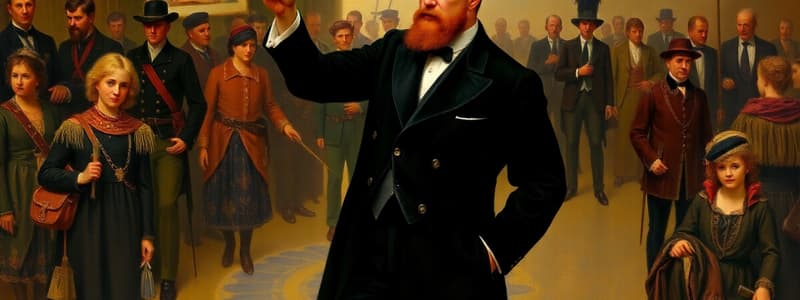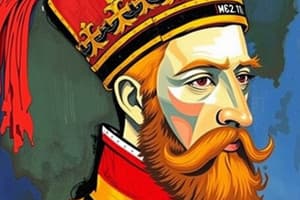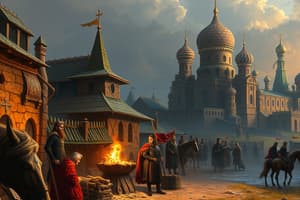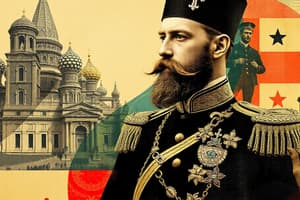Podcast
Questions and Answers
What option did Alexander II have regarding his approach to reform and public opinion?
What option did Alexander II have regarding his approach to reform and public opinion?
- Only focus on military advancements
- Continue with extensive reforms
- Ignore public opinion completely
- Return to reform or continue repression (correct)
What is the significance of Alexander II's quote about making enemies?
What is the significance of Alexander II's quote about making enemies?
- It shows his intention to provoke opposition
- It highlights his commitment to isolationism
- It indicates his belief that the public was ungrateful (correct)
- It reflects his understanding of political loyalty
What did public sentiment appear to be towards the Land and Liberty group?
What did public sentiment appear to be towards the Land and Liberty group?
- Aligning with calls for reform (correct)
- Supportive of government repression
- Opposed to any form of change
- Indifferent to the group's goals
Which group was involved in discussions that contributed to the calls for reform during Alexander II's reign?
Which group was involved in discussions that contributed to the calls for reform during Alexander II's reign?
What does the phrase 'huge what if of Russian history' imply about the outcomes of Alexander II's decisions?
What does the phrase 'huge what if of Russian history' imply about the outcomes of Alexander II's decisions?
What was a major challenge faced by the intelligentsia in convincing the peasants by 1879?
What was a major challenge faced by the intelligentsia in convincing the peasants by 1879?
What was the main tactic used by the ‘Chaikovsky Circle’ in their approach?
What was the main tactic used by the ‘Chaikovsky Circle’ in their approach?
What key belief did Herzen advocate concerning the peasants in Russia?
What key belief did Herzen advocate concerning the peasants in Russia?
What was the outcome of the Populists' ‘movement to the people’ in 1874?
What was the outcome of the Populists' ‘movement to the people’ in 1874?
What did the intelligentsia hope to achieve by convincing the peasants?
What did the intelligentsia hope to achieve by convincing the peasants?
Which of the following best describes the effectiveness of the Peasant and nobility opposition after the early 1860s?
Which of the following best describes the effectiveness of the Peasant and nobility opposition after the early 1860s?
What event triggered the escalation of opposition against Alexander II that culminated in assassination plans?
What event triggered the escalation of opposition against Alexander II that culminated in assassination plans?
What social class primarily comprised the Populists (Narodniks) movement?
What social class primarily comprised the Populists (Narodniks) movement?
What was the main reason the Populists failed to gain support from the peasants initially?
What was the main reason the Populists failed to gain support from the peasants initially?
Who led the organization 'Land and Liberty'?
Who led the organization 'Land and Liberty'?
What were the trials, such as the trial of 'the 50' and 'the 193', significant for the Populists?
What were the trials, such as the trial of 'the 50' and 'the 193', significant for the Populists?
What was one of the repercussions of Vera Zasulich's actions against General Trepov?
What was one of the repercussions of Vera Zasulich's actions against General Trepov?
What did 'Land and Liberty' demand regarding land ownership?
What did 'Land and Liberty' demand regarding land ownership?
Which event signified a shift in public sentiment towards the revolutionaries in 1878?
Which event signified a shift in public sentiment towards the revolutionaries in 1878?
What actions did political prisoners in St Petersburg take that increased tensions?
What actions did political prisoners in St Petersburg take that increased tensions?
What key outcome did the government implement after the trials of the Populists?
What key outcome did the government implement after the trials of the Populists?
How did the public react to the verdict announced on Vera Zasulich's trial?
How did the public react to the verdict announced on Vera Zasulich's trial?
Which of the following illustrates the government's perception of its authority after the trials?
Which of the following illustrates the government's perception of its authority after the trials?
What event occurred due to escalating revolutionary activities following the trials?
What event occurred due to escalating revolutionary activities following the trials?
How did the revolutionaries benefit from the public trials held in 1878?
How did the revolutionaries benefit from the public trials held in 1878?
What describes the overall state of the government following the events of 1878?
What describes the overall state of the government following the events of 1878?
What perceived actions by the government intensified revolutionary activity during this period?
What perceived actions by the government intensified revolutionary activity during this period?
Flashcards are hidden until you start studying
Study Notes
The Development of Opposition to Alexander II (1867-1879)
- Early Opposition (1867): Peasants, nobility, and growing intelligentsia movement opposed Alexander II's reforms, culminating in attempts on his life.
- The Rise of the Intelligentsia: The intelligentsia emerged as a formidable opposition, believing they could convince peasants to join their cause.
- Herzen's "Go to the People": In 1869, Herzen encouraged young activists to connect with the peasants, believing their message of socialism based on the mir would resonate.
- The Chaikovsky Circle: This revolutionary group, active from 1869 to 1872, distributed propaganda and banned books, seeking to ignite peasant mobilization.
- The Narodniks (Populists): The Narodniks, influenced by Herzen, aimed to inspire peasant revolution; their "movement to the people" in 1874 failed to achieve significant support.
- The Peasants' Apathy: Peasants remained focused on survival and lacked understanding of "rights," making them unresponsive to the Narodniks' message.
- The "Land and Liberty" Group: While the Narodniks' attempts to inspire a peasant uprising had initially failed, they gained traction due to government actions.
- The Trials of 1877-78: The government's prosecution of 193 and 50 revolutionaries in 1874 resulted in nationwide publicity for their cause, ultimately benefiting their movement.
- The Zasulich Case: Vera Zasulich's acquittal for shooting General Trepov in 1878 further ignited the opposition, demonstrating the government's weakness and perceived incompetence.
- The Spread of Violence: The assassination of General Mezentsev in reprisal for the death of political prisoners and the escape of the assassin highlighted the government's declining power.
- The Zemstvo's Involvement: Even some local administrative bodies (zemstva) were engaged in secret negotiations with "Land and Liberty," seeking constitutional reforms through pressure.
- The Congress of Berlin (1878): The diplomatic defeat at the Congress of Berlin further fueled public dissatisfaction, leading to strengthened calls for reform.
- Alexander II's Perspective: Alexander II, perceiving the opposition as ungrateful for his reforms, believed he had made positive changes for the country.
- The Watershed of 1878: This year marked a turning point, with a growing sense of unrest, public support for radical ideas, and a government seemingly unable to control the situation.
- Alexander II's Dilemma: Facing increasing pressure and widespread dissatisfaction, Alexander II was faced with a critical decision: to continue repressive measures or to embrace significant reforms.
Studying That Suits You
Use AI to generate personalized quizzes and flashcards to suit your learning preferences.




